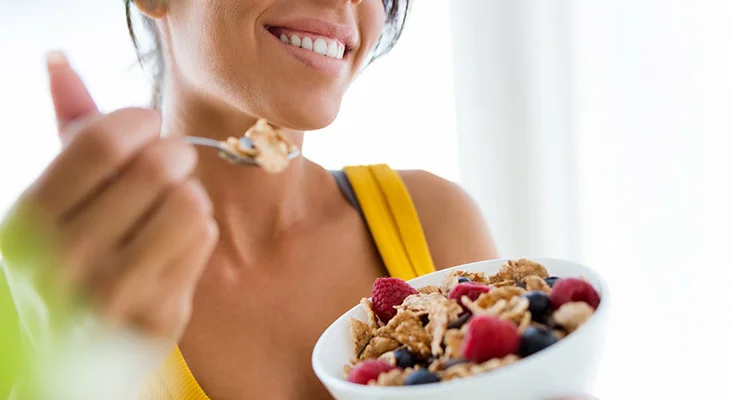
If you stick to eating the majority of your meals from the five food groups, your body will feel great, your performance will improve, your muscles will be toned, you will stand tall and you will have a more positive mindset in whatever you do.
Every food group provides nutrients and energy that can support the body’s growth, function, performance and overall health. Feeding your body foods from the five food groups will give you the fuel you need without additional fat and calories that can lead to unhealthy weight changes and poor health.
Grains
Grains are foods made from wheat, rice, oats, cornmeal, barley or other cereal grains. Whole grains contain the entire grain kernel. Refined grains have been milled to remove parts of the grain kernel to produce a finer texture.
Whole grains include:
- Whole-wheat flour
- Buckwheat
- Bulgur (cracked wheat)
- Oatmeal
- Whole cornmeal
- Popcorn
- Rye
- Brown rice
- Wild rice
- Whole-wheat cereal
Refined grain products include:
- White flour
- White bread
- Most cornbread
- Flour tortillas
- Most pasta
- Pretzels
- White rice
Norton Sports Health
You don’t have to be an elite athlete to get specialized sports medicine care from the Norton Sports Health team.
Grains are a good source of carbohydrates that provide energy through frequent and intense workouts, practices and games. Include three to five servings of whole grains in your diet every day.
Vegetables
Any vegetable or 100% vegetable juice counts as a member of the vegetable group.
Vegetables are grouped as dark green vegetables, starchy vegetables, red and orange vegetables, and other vegetables. Peas and beans are also vegetables but are classified as a protein food and grouped in the same food group as meat.
Dark green vegetables include:
- Bok choy
- Kale
- Broccoli
- Collard greens
- Spinach
Red and orange vegetables include:
- Squashes
- Carrots
- Red peppers
- Sweet potatoes
- Tomatoes
Starches
- Corn
- Green peas
- Potatoes
Other vegetables that are great for you include:
- Artichokes
- Avocado
- Sprouts
- Beets
- Brussels sprouts
- Cabbage
- Cauliflower
- Eggplant
- Mushrooms
- Green beans
Everyone, no matter how active, should eat two to three cups of vegetables a day.
Fruit
Any fruit or 100% fruit juice counts as a member of the fruit group.
Fruit includes:
- Apples
- Applesauce (no sugar added)
- Bananas
- Berries
- Figs
- Grapefruit
- Grapes
- Kiwi
- Melons
- Peaches
- Oranges
- Raisins
- Prunes
- Dates
Choose whole fruit over 100% fruit juice more often to increase fiber in your diet. Dried fruits can be counted as part of your fruit intake as well. Just watch for how much sugar is in dried fruit.
Fruit is a great energy booster before or after exercise. Eat about 2 cups of fruits a day.
Proteins
All foods made from meat, poultry, seafood, beans and peas, eggs, soy products, nuts and seeds are considered part of the protein food group.
Select a variety of protein foods each day — it doesn’t have to be all meat. Nuts and seeds are an easy, packable way to get a protein boost. Try to eat at least 8 ounces of cooked seafood per week as well. Choose lean meats and keep red meat to a minimum.
Athletes should make sure they get at least 10 to 30 percent of their calories from protein. An endurance athlete needs 0.55 to 0.6 grams of protein per pound of body weight daily, while a power athlete (speed or strength training) needs 0.55 to 0.77 grams per pound of weight to maintain muscles and stay healthy.
Dairy
Any milk product is part of the dairy food group. These include milk alternatives, such as soy milk, almond milk, etc. Dairy is an important part of a balanced diet because it provides calcium for strong bones and muscles.
When eating or drinking dairy, choose fat-free or low-fat items. These include milk, yogurt, cheese and pudding.
Everyone, no matter how active, should have about 3 cups of dairy a day.
Junk Food Is Not a Food Group
Packaged foods — anything that comes in a box, can, bag or fast-food container — is processed food.
Processed foods include:
- Snack foods
- Lunchmeat
- Chips
- Store-bought baked goods
- Candy
- Convenience food
These foods should be eaten infrequently. If you need a chocolate fix, make brownies at home with whole ingredients, not a mix.
